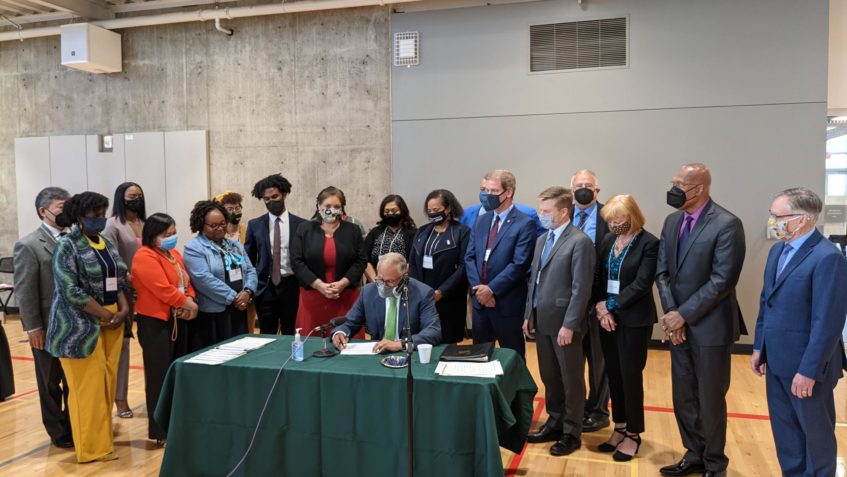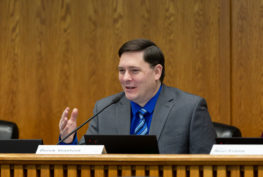OLYMPIA – A package of law enforcement accountability legislation was signed by Gov. Jay Inslee today, increasing state oversight of police conduct, banning dangerous and unnecessary police practices, and raising standards for police conduct.
“The public outcry over a series of high-profile deaths of members of Black, Indigenous, and people of color communities has now led to the most significant new accountability measures in our state’s history,” said Sen. Jamie Pedersen (D-Seattle), chair of the Senate Law & Justice Committee and bill sponsor. “The killing of George Floyd, Manuel Ellis, Charleena Lyles, John T. Williams and many others compelled us to craft laws to protect our whole community by limiting police use of force, increasing transparency, and improving accountability.”
“We worked closely with communities who have been suffering violence at the hands of the police,” said Sen. Manka Dhingra (D-Redmond), vice chair of the Senate Law & Justice Committee and bill sponsor. “These measures will help keep communities safe by holding officers to the high ethical standards that Washingtonians expect and deserve. They will provide more tools and support to the vast majority of officers who are already living up to these high standards.”
“In some situations, civil liability is a vital avenue for those seeking justice to have their day in court,” said Sen. David Frockt (D-Seattle), a bill sponsor. “Changes to standards signed into law today will make our law more rational and fair so that the search for truth can be fully realized, wherever its outcomes lead.”
The twelve bills signed by Inslee today were:
- SB 5051, sponsored by Pedersen, provides timely and effective enforcement of state standards for law enforcement officers, allowing the Criminal Justice Training Commission to discipline officers unfit to carry a badge and gun. It also expands the commission so that a majority of members are from the community and not employed by any law enforcement agency.
- SB 5066, sponsored by Dhingra, establishes clear standards for police officers to intervene when fellow officers use force unjustly and to report any wrongdoing by fellow officers.
- HB 1054, sponsored by Rep. Jesse Johnson, bans the use of chokeholds, neck restraints, no-knock warrants, certain military equipment, and the intentional concealment of badges. It also substantially restricts the use of tear gas and high-speed chases.
- HB 1310, also sponsored by Johnson, establishes a civil standard for peace officer use of force.
- HB 1267, sponsored by Rep. Debra Entenman, creates a new office to conduct independent investigations of deadly uses of force, custodial deaths, and other officer-involved incidents.
- HB 1088, sponsored by Rep. John Lovick, sheds light on officers who are not credible witnesses because of their previous conduct.
- SB 5263, sponsored by Sen. David Frockt, gives families that have had a loved one killed by police a better chance to have their day in court.
- SB 5259, sponsored by Sen. T’wina Nobles, establishes comprehensive statewide reporting and publication for use-of-force incidents involving law enforcement.
- HB 1089, sponsored by Rep. Bill Ramos, brings transparency to investigations into police use of deadly force.
- SB 5353, sponsored by Sen. Steve Conway, creates a partnership model that facilitates community engagement with law enforcement.
- HB 1140, sponsored by Johnson, requires juveniles have access to attorneys before waiving their constitutional rights when they have been contacted by law enforcement.
- HB 1223, sponsored by Rep. Strom Peterson, requires law enforcement to record interrogations at detention centers if the interrogation is of a juvenile or an adult suspected of a felony.
SB 5055, sponsored by Sen. Joe Nguyen (D-West Seattle), improves transparency, professionalism and equity of arbitration for law enforcement collective bargaining. It was signed into law on April 7.
SB 1140 takes effect on Jan. 1, 2022; HB 1223 takes effect in part on July 25, 2021, and in part on Jan. 1, 2022; SB 5259 has several effective dates; and all the other bills take effect on July 25, 2021.





